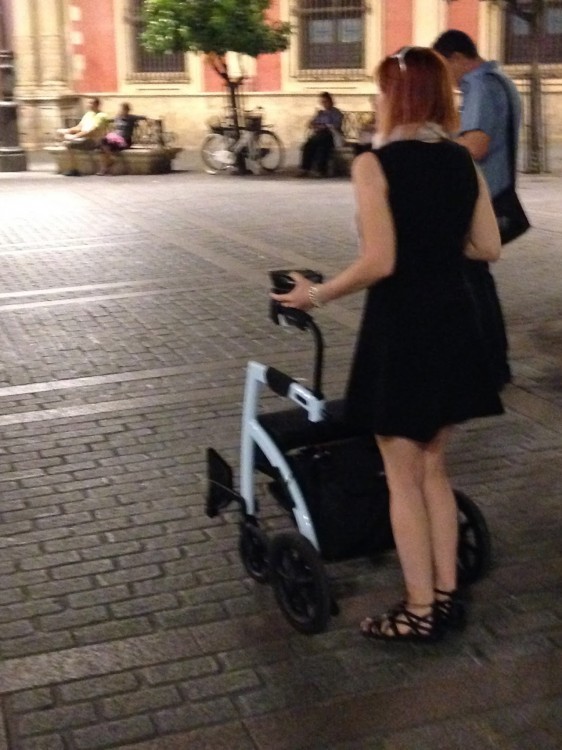I’ve just returned from the most fantastic vacay to Spain and France with The Banker (my husband) and Optimus Prime, my sexy new sidekick and cool, convertible rollator (walker).
This trip was my first time traveling with Optimus, and all three of us were nervous.
The Banker: “Will it be hard to get in and out of cabs, train stations and airports? Will we be holding up traffic and pissing people off?”
Optimus: “Will I get thrown around by surly baggage handlers? Will I be damaged in transit, leaving my new BFF stranded and without assistance?”
Me: “What will people say? How will they treat me differently with my new entourage?”
These were among our excessively polite Canadian concerns. But in the end, we had no reason to fret. The Banker had practiced packing and converting Optimus and could do it in a slick 90 seconds. Optimus returned to Canada un-traumatized, with the exception of one inevitable Parisian dog merde encounter. And surprisingly, nobody said anything to me about my obvious accessory. Well, that’s not entirely true. I really did get some compliments on my awesome boots. I’m telling you, they are beautiful boots.

Optimus Prime is still a bit shy about being photographed. (Not pictured: my bad ass boots)
I was grateful to ease into things with Optimus without having to respond to any raised eyebrows. We were out and about every day, but my differences never came up in casual conversation. This was unexpected, because it’s not the same here in “polite” Canada. Sometimes it takes leaving our homes and experiencing a different culture to see things a little more clearly.
On this side of the ocean, I’ve been fielding questions about my deal ever since I started using a cane a few years ago, and it’s only ramped up since I began using a rollator. What’s wrong with your leg? What did you do? What happened? I get it. You’re not used to seeing people like me: young but using the tools of the old. For whatever reason, we feel we need to comment or ask questions. It’s like our collective discomfort around disability forces us to fill the air, to address the elephant in the room, or on the street for that matter. I end up feeling like I have to reveal personal information, explain myself. I end up feeling like I’m the elephant.
Why do we think we can make these comments to total strangers? Is it a general feeling of superiority over persons with disabilities? What do we really want to know? Maybe these comments seem benign; people who are just trying to make conversation. I don’t believe everyone who talks to me is a nosy jerk, but these interactions are not OK. These questions all boil down to “What’s wrong with you.”
“What’s wrong with you?” is not an acceptable ice breaker.
After two whole weeks of not being put on the spot with questions about my body, things changed as soon as we passed customs at Pearson when an elderly man gestured to my rollator and said, “I’m just glad I don’t need one of those yet.” What’s frustrating is, I hear stuff like this all the time.
I used to politely answer, putting the comfort of others ahead of my own, and feeling like I had no ownership over my personal health status. I felt like I owed everyone an explanation and even an apology, because it often feels like my clumsy presence is an inconvenience. I would insist that “It’s not that bad,” doing my best to make others feel comfortable in the awkward situation they’d unwittingly created. A situation where everyone you encounter first sees you and labels you with something negative, with a defect, and then actually says it out loud. Imagine your most personal struggle in life. Now, imagine that everyone you meet asks you to tell them what that is before they even ask your name. What would you say?
I don’t want to do that anymore. I’ve been experimenting with alternate answers, and lately when someone would ask “What happened?” I would shrug it off saying “Genetics.” But that seemed like a cruel response when I was asked and found my mother standing next to me. So yesterday, when a curious stranger gave me the up-down before declaring, “You’re too young to be using one of those,” Fantasy-Me boldly said, “You’re too old to be asking rude questions.” But Reality-Me just didn’t answer. When he didn’t get the hint and kept questioning, I awkwardly walked away, muttering something about croissants. I still felt ill at ease, but I also felt good about having protected my privacy. He didn’t deserve this kind of intel, and by my refusal to give it, he could only label me as “bitch” and not “MS patient.” Turns out I’m both, but it’s up to me to decide if you get to know that.
Later when I obsessed over what I should have said that would have left us both feeling better, it suddenly came to me. The answer that I’ve been searching for is so simple I can hardly believe it’s never occurred to me before:
“That’s a little personal; I’d rather not say.”
I can say it in my nice voice, with a smile, using the manners I was raised with and everyone walks (or rolls) away feeling good. It’s so easy.
Maybe that excessively polite reputation we Canadians have is not an accurate stereotype. Maybe we need to take an example from our Euro friends. Drink more wine, eat more cheese, and ask fewer questions.
Follow this journey on Tripping On Air.
We want to hear your story. Become a Mighty contributor here.

